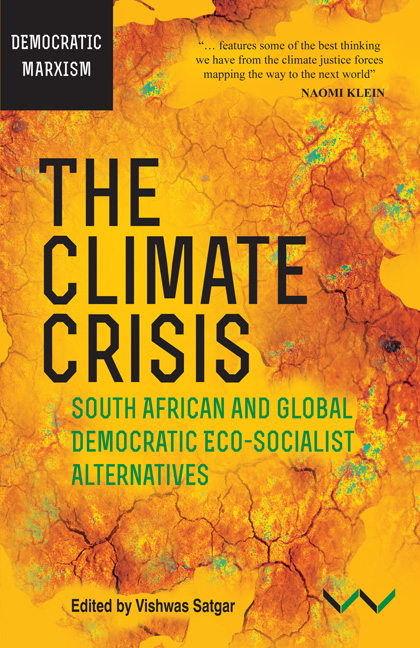Book contents
- Frontmatter
- Contents
- Tables and Box
- Acknowledgements
- Acronyms and Abbreviations
- Chapter 1 The Climate Crisis and Systemic Alternatives
- PART ONE THE CLIMATE CRISIS AS CAPITALIST CRISIS
- PART TWO DEMOCRATIC ECO-SOCIALIST ALTERNATIVES IN THE WORLD
- Chapter 4 The Employment Crisis, Just Transition and the Universal Basic Income Grant
- Chapter 5 The Rights of Mother Earth
- Chapter 6 Buen Vivir: An Alternative Perspective from the Peoples of the Global South to the Crisis of Capitalist Modernity
- Chapter 7 Challenging the Growth Paradigm: Marx, Buddha and the Pursuit of ‘Happiness’
- Chapter 8 Ubuntu and the Struggle for an African Eco-Socialist Alternative
- Chapter 9 The Climate Crisis and the Struggle for African Food Sovereignty
- PART THREE DEMOCRATIC ECO-SOCIALIST ALTERNATIVES IN SOUTH AFRICA
- CONCLUSION
- Contributors
- Index
Chapter 9 - The Climate Crisis and the Struggle for African Food Sovereignty
from PART TWO - DEMOCRATIC ECO-SOCIALIST ALTERNATIVES IN THE WORLD
Published online by Cambridge University Press: 05 June 2019
- Frontmatter
- Contents
- Tables and Box
- Acknowledgements
- Acronyms and Abbreviations
- Chapter 1 The Climate Crisis and Systemic Alternatives
- PART ONE THE CLIMATE CRISIS AS CAPITALIST CRISIS
- PART TWO DEMOCRATIC ECO-SOCIALIST ALTERNATIVES IN THE WORLD
- Chapter 4 The Employment Crisis, Just Transition and the Universal Basic Income Grant
- Chapter 5 The Rights of Mother Earth
- Chapter 6 Buen Vivir: An Alternative Perspective from the Peoples of the Global South to the Crisis of Capitalist Modernity
- Chapter 7 Challenging the Growth Paradigm: Marx, Buddha and the Pursuit of ‘Happiness’
- Chapter 8 Ubuntu and the Struggle for an African Eco-Socialist Alternative
- Chapter 9 The Climate Crisis and the Struggle for African Food Sovereignty
- PART THREE DEMOCRATIC ECO-SOCIALIST ALTERNATIVES IN SOUTH AFRICA
- CONCLUSION
- Contributors
- Index
Summary
Despite over twenty years of international negotiations, there is no agreement on the reduction of carbon emissions. In fact, emissions have risen sixty-one per cent over this period and are having devastating impacts, particularly on the African continent. This is occurring despite Africa's limited contribution of four per cent to global carbon emissions, pointing to the importance of securing a ‘just transition’ to a post-carbon world. Justice demands that those countries of the industrial north that are most responsible for the climate crisis should take responsibility for solving it. This is acknowledged in the logic and principle of ‘common but differentiated responsibilities’ built into the climate negotiations process. However, climate negotiations are increasingly shifting away from measurable mandatory emissions reduction by industrialised nations, while African nations are pushed relentlessly to buy into an agribusiness agenda through initiatives such as the New Alliance for a Green Revolution in Africa and the New Alliance for Food Security and Nutrition (NAFN). These top-down initiatives are ultimately aimed at undercutting, displacing and impoverishing smallholder farmers, who produce between sixty and seventy per cent of the continent's food. These initiatives undermine the realisation of food sovereignty, a genuine people's alternative to control the food system in Africa. It is the final offensive in a calculated drive by capital to conquer the African agricultural market and impose the largely discredited industrial agricultural model, an agenda that has been relentlessly pressed on the continent in one guise or the other over the past forty years. This model ‘has created a complex system of interlocking oligopolies that span seeds, agrochemicals, biotechnology, trading, retailing and consumer goods companies’ (Hilary 2013: 120). John Hilary points out that ‘just three transnational corporations – Monsanto, DuPont and Syngenta control between them over half the world's entire commercial seed market’ (2013: 120). The impact of this model on the African continent is devastating and aggravated by the process of accelerating climate change.
THE IMPACT OF CLIMATE CHANGE ON AFRICA
Africa is set to suffer severe impacts from global warming if nothing is done to drastically cut carbon emissions. The Intergovernmental Panel on Climate Change (IPCC) stresses that
continued emission of greenhouse gases will cause further warming and long-lasting changes in all components of the climate system, increasing the likelihood of severe, pervasive and irreversible impacts for people and ecosystems.
- Type
- Chapter
- Information
- Climate Crisis, TheSouth African and Global Democratic Eco-Socialist Alternatives, pp. 190 - 208Publisher: Wits University PressPrint publication year: 2018



